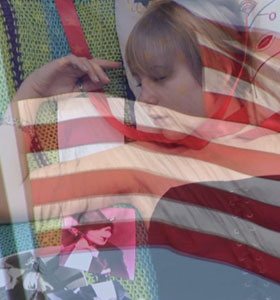



Thinking about how much smaller and more ubiquitous cameras are today than just 10 years ago (and thinking about how they interface with computers and becoming increasingly popular for monitoring robots and replacing human workers in manufacturing settings), remembering how awkward puberty was and being baffled by what it must be like today (at the same time wondering if our parents thought the same thing..), seeing people with untreated mental illnesses who are so easily ignored and forgotten by fiscal conservatives, [...]. Being pleasurably infuriated and baffled by television news, especially Glen Beck. Science Fiction, punk rock, belly dancing music. And of course the history of human expression, going back to cave paintings and ending [TBD] somewhere in the Mirror Universe
It's a tie between Gegen Musik (Counter Music) by Harun Farocki, Not to be Reproduced by Rene Magritte, and Rebellious Jukebox by The Fall.
The originals belong on The Moon, the International Space Station, or any other space outside our atmosphere. But the proper home of the reproductions is anywhere that anyone wants to see/experience it, free of charge, and free of any context that it does not define in itself.
When riding on public transportation and eavesdropping on others' conversations, watching Star Trek, and listening to other people who know a great deal more than I do talk about classical Hollywood cinema.
I hope that I will be living with my romantic partner, somewhere that is dreamy and quiet and near a water source. I see my artwork involving working with a great deal of people around the world, using advanced technology with a lot of touch screens, but continuing to explore basic analog circuitry. We'll be working on figuring out a way to fix the global educational system, transition out of money economy, make movies that are as intelligent as they are entertaining, and protect childhood in such a way that Forbes magazine no longer refers to the production of knowledge in light of running children through schools that are more like factories where they have little contact with other human beings and are simply seen as assets to a strong, passive, national workforce that simply secures economic and political power and forgets that love is real, healthy, often painful, and vitally important. Between now and then would involve some component of reworking the cyborg myth into a romantic, epic narrative as well as composing a Choose your own Adventure videobook that makes systems theory approachable and entertaining for the Everyman - as well as motion sensors, hypersensitive cameras, ultra-HD or 3D projectors, theramins, Dream Machines, organs, gongs, [...] through which I could be involved in some type of musical/visual/theatrical/dance troupe that, despite enthusiastic requests from world leaders (who have hopefully made peace) , focuses on performing for the average citizen and leads workshops for youth.
Winning the prize would mean that I can die happy.

In preparing my artist statement to submit to the illustrious Society of 23 Prize competition, I must first take a step back and contemplate these words separately. Considering the honor that befalls me in being nominated, not to mention an awareness of the earth-shattering implications of being associated with this prestigious assembly, I feel that, at the very least, I owe this too all the members of the Society, their affiliates, families, enemies, and not least of all the other nominees. Thus, we begin with a consideration of what the Microsoft Dictionary provides me:
statement |'stātmənt|
noun
a definite or clear expression of something in speech or writing : do you agree with this statement? | this is correct as a statement of fact.
• an official account of facts, views, or plans, esp. one for release to the media : the officials issued a joint statement calling for negotiations.
• a formal account of events given by a witness, defendant, or other party to the police or in a court of law : she made a statement to the police.
• a document setting out items of debit and credit between a bank or other organization and a customer.
• the expression of an idea or opinion through something other than words : their humorous kitschiness makes a statement of serious wealth.
• Music the occurrence of a musical idea or motive within a composition : a carefully structured musical and dramatic progression from the first statement of this theme.
A clear expression, an official account, a formal account, [...], none of these so far seem to evoke what I am meant to do now. Ah, here we go: a document setting out items of debit between a bank [...] and a customer.
If I am the bank and the public at large (and in perpetuity) is the customer, then, well, then it appears I should be outlining the specifics of what they owe me... Otherwise, if the terms were reversed and I was customer, then I would be the one in receipt of the statement. This would lead me to question why I am the one writing it... Or perhaps it is not the public at large who stand as the customer, but society, an order dictated from above, or outside of, its own needs. In this case, what I am owed is no different from what the rest of us commoners deserve: enough oxygen to stay alive, and enough water to keep afloat.
Now, this expression of an idea or opinion through something other than words is nearly as impossible to insert into this word processing program as would be an occurrence of a musical idea or motive within a composition... One of my motives, within the composition of my life, is to foster the growth and development of creativity beyond the parameters imposed by profit, and reason. Here is one such occurrence, embodied in the symbol:
artist |'ärtist|
noun
a person who produces paintings or drawings as a profession or hobby.
• a person who practices any of the various creative arts, such as a sculptor, novelist, poet, or filmmaker.
• a person skilled at a particular task or occupation : a surgeon who is an artist with the scalpel.
• a performer, such as a singer, actor, or dancer.
• informal [with adj.] a habitual practitioner of a specified reprehensible activity : a con artist | rip-off artists.
ORIGIN early 16th cent. (denoting a master of the liberal arts): from French artiste, from Italian artista, from arte art, from Latin ars, art-.
Once again, it seems the informal definition is most suitable for our purposes: as a habitual practitioner of a specified reprehensible activity, I will say that I seek to draw attention to biases, hypocrisies, and failures of logic within human culture without necessarily creating, or falling victim to, new ones. I do this through various experiments with recording technologies, such as cameras (still and moving), pen and paper, various computer programs, and accessing and engaging with various 'already existing' records, such as LPs, films, and texts. But history is as fickle a muse as reason, and for this reason, I will now conclude by way of the unification of these terms as provided in this moment's (11:25 am PST 8 January 2011) collective definition as is housed in Wikipedia:
An artist's statement (or artist statement) is a brief statement of an artist's intention through their work.
Content - It is a text composed by an artist and intended to explain, justify, and contextualize his or her body of work. Artists often have a short (50-100 word) and/or a long (500-1000 word) version of the same statement, and they may maintain and revise these statements throughout their careers.
Context and usage - The writing of artists' statements is a comparatively recent phenomenon. In some respects the practice resembles the

I grew up in Minnesota in a humble family of computer programmers, medical professionals, teachers, and business persons. My interest in moving images started as a child, watching Baywatch with my father and Star Trek: The Next Generation with my mother. I began 'working' in art at the age of 15 when I was hired through a (taxpayer funded) summer program that arranged students with apprenticeships in the arts followed by an art fair whose funds then contributed (in part) to the next year's program. It was here that I learned silversmithing and jewelry manufacturing, and became acquainted with the tenuous gap between arts and crafts that continues to disturb me. Following this endeavor, I began an internship with an architecture firm and began working with other schoolmates on short videos. I eventually found myself studying German literature and culture, film and media, and linguistics and focusing on the role of fantasy in the production of knowledge.
I studied in Berlin and Prague for a period of my undergraduate degree, and developed a keen interest in the writers and theoreticians behind the Soviet schools of semiotics (the Prague Linguistic Circle and the Moscow-Tartu school), as well as the impact of exile on writers and artists. In the year between my BA and the beginning of my time at SFAI, I worked in clinical research and became acquainted with financial and database systems as well as the intersections between the pharmaceutical and music industries in light of intellectual property law. I also wrote for and served as an editorial associate for an independent arts newspaper in Minneapolis and began dabbling in guerilla video production: co-producing a public access television show and designing and facilitating a film course through the local Experimental College.
After being rejected from the Rhetoric department at UC Berkeley, where I had been planning to go for a PhD since the age of 16, I followed the advice of my mentors and friends and began investigating MFA programs. This investigation began and ended at SFAI, based on nothing more than a magnetic feeling, and remains one of the most stimulatingly troublesome and rewarding decisions I have ever made. Having been only peripherally involved in Art prior to this point, my experiences thus far have been riddled with astonishment and delight in finding myself company to such wild and imaginative energies overcome by a pressing urge to catalogue, document, and discursively explore rather than physically produce. I have enthusiastically sought opportunities to be involved in global collaborations involving new media, archives, and informational aesthetics. Through one such program, Living Archives, I made the acquaintance of Clémence de Montgolfier with whom I started The Big Conversation Space and to whom I dedicate all my work.
Despite the length of this biography, I feel as if I have covered very little, but the year that has passed since arriving at SFAI has involved far too vast a well of experiences for me to fully explain in this context. If you wish to learn more about me, and in turn tell me about yourself, please seek me out through the appropriate channels or look forward to the release of nikileaks later this winter.